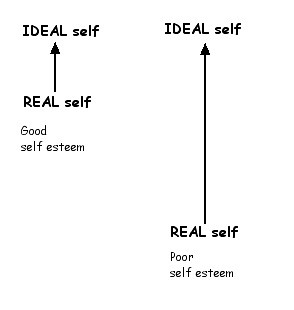Compare and contrast.
It seems they use it to make self feel better, and to make self feel worse.
Recent research reported by Canada’s Concordia University (only in Canada!).
People who hold onto their regrets put their health at greater risk. Research demonstrated one mechanism for coping with regret was to compare self to someone who is worse off and this it was found, boosted their emotional well-being. Those who compared self with more successful people experienced a worsening of symptoms.
An interesting finding in relation to the experience of regret. Not one which I would see as particularly healthy but that is for consideration at another juncture.

As a therapist it is something that one hears clients report, not uncommonly.
“I have been thinking of coming to therapy for some time but my problems seemed insignificant compared to others”.
Another common method is to compare and contrast self with a fantasised image such as this diagram shows.

In this instance the person does not even compare to another person but to a fantasised ideal image. This I think it is safe to say is quite common. We all have things about ourselves which we would like to be different which would make us ‘better’. Often therapy is about lowering the ideal self. The closer the real self and ideal self become the more self esteem one experiences.
This can also occur when the fantasised image is projected onto another. For instance in positive transference the therapist can be idealised to varying extents by the client. The client can then compares self to the idealised image projected onto the therapist.
One could say that when a person uses the compare and contrast method they are seeking an external reference point in order to understand self.
Is this a good thing?
Is it psychologically productive to compare self to others?

The alternative is to not look outside and simply look at self and assess self in that way irrespective of others. To my mind that is probably more healthy. Simply to be who you are.
However it probably is fairly normal to do a bit of compare and contrast. It is probably normal to use others as an external reference point in order to understand ourselves. If this is the case then one would be assessing the degree of compare and contrast used and if they use it for psychological health or pathology.
There is always someone smarter, richer, funnier, more intelligent, a better conversationalist and so on. Thus one could continually use the compare and contrast method to feel continually bad as one never matches up in the end. In this case compare and contrast would be seen as pathology driven.
Then there is the other approach
This is where I arrive at what the Canadians do. Compare self to someone who is worse off then one can feel better about self. There is something not quite right about this. Whilst it may provide short term self assurance I have my doubts about its long term success. To feel better about self because someone is worse I do not think is going to work in the longer term. There is something intrinsically not right about it and that in my view will probably come through in the longer term and thus the individual will suffer as a result.

Indeed here, I have provided a new theory of life positions. One of the points I make is that the life position of I’m OK, You’re not OK is more accurately stated as I’m not OK, But you’re worse. I can make myself feel better if I can see you as worse. It is stated in the article,
“it is not possible to view others as not-OK unless one views at least part of one's self as not-OK.”
To see others in a bad light does not deal with the persons own sense of not OKness. Indeed it could even be seen to reinforce it. As a therapist I would not be willing to contract with the client who wants to see others as worse in order to feel better in them self.
Finally compare and contrast could be used as a way to maintain pathology. One finds this when working with drug users. The worst thing that can happen to the habitual drug user is for an associate to stop using. This highlights for them what they are doing with their life. To compare and contrast self with other drug users one can get an assurance of their own OKness and to keep using.

Compare and contrast is a normal human endeavour.
The less one does it the better.
Psychopathology is indicated when:
One uses it a lot.
It is persistently used to maintain a poor self view.
It is used to maintain self defeating behaviour.
Graffiti
Not something I do. I think if I got in the position I am not OK but you are worse - well I think I would then have feelings of guilt.
ReplyDeleteIs compare and contrast a cultural thing to an extent?
Hi K,
ReplyDeleteI also don't think I do it much as well. To make self feel better by seeing others as worse is not really a very productive solution I think.
Cheers
Tony
When does empathy move from genuine care for others and into the compare and contrast situation. Is there a fine line there? Is altruism a true thing?
ReplyDelete